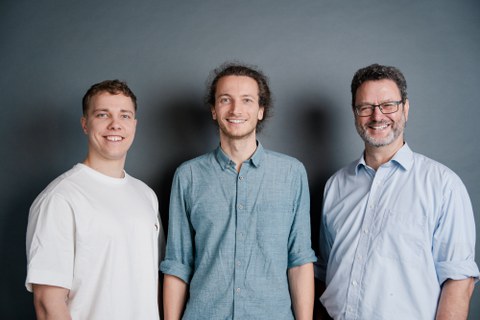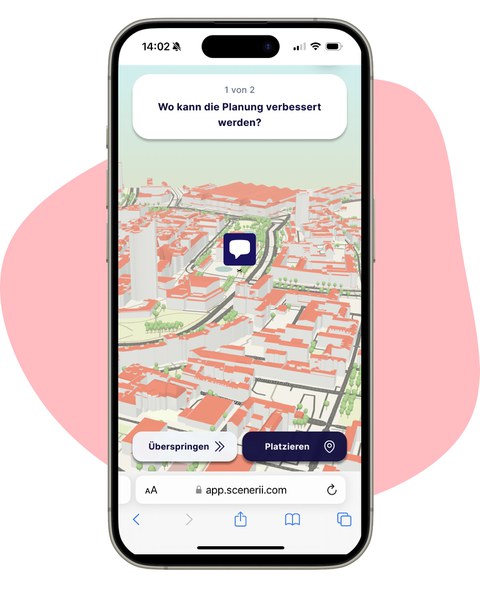Jun 06, 2024
Joining forces to plan the city of tomorrow: TUD-WISSENSARCHITEKTUR start-up “Scenerii” offers cities and their residents a flexible participation tool

From left: Richard Prusas, Konstantin Doll, Torsten Helmer
U_CODE is now Scenerii. The novel tool makes it easier than ever for local authorities to find out about their citizens' wishes and opinions on urban development. Thanks to start-up funding from the Exist research transfer program, the TUD-WISSENSARCHITEKTUR team was able to continue developing the award-winning co-design tool U_CODE and expand it into a start-up.
Making urban planning agile
“Scenerii allows urban planning to work in a much more agile way than before,” explains Richard Prusas. Along with two other colleagues, he was instrumental in driving the development of the platform at TUD and is now CEO of Scenerii. The new tool makes it possible to obtain feedback from the population or certain interest groups in the early planning stage of a construction project. “The urban planners will get indications of risks and weaknesses in the concept, an opinion on the planned changes and maybe even inspiring suggestions from the ‘swarm intelligence’ of those involved,” says Prusas, outlining the advantages: “Scenerii can visualize the city of tomorrow to the people. And they can actively contribute to this vision.”
No more Stuttgart 21
The idea for U_CODE and Scenerii came about as a lesson learned from Stuttgart 21, a highly controversial railway and urban development project. Subsequent changes to such large-scale projects are expensive and often damage the project's image. Therefore, a group from WISSENSARCHITEKTUR - Laboratory of Knowledge Architecture looked for ways to involve citizens at an earlier stage. During a summer school, they came up with the idea for a tool that allows users to build designs or comment on existing designs in a low-threshold and playful way using a 3D model.
Based on this idea, the researchers developed U_CODE as part of an international Horizon Europe funding project (2016-2019). Since then, this co-design tool has proven its worth in local (Fritz-Foerster-Platz) and international urban planning projects (India, Kenya). In 2021, U_CODE was awarded the Ralf Dahrendorf Prize for Science Communication as an “outstanding project in the European research area.” WISSENSARCHITEKTUR invested the prize money in a roadshow to test the tool's use in schools and at youth festivals.
Option of free test surveys
The advanced “Scenerii”, the development of which is being funded by the exist program until the end of 2024, is now available to all cities and municipalities via the scenerii.com website. Getting started is free of charge: Prospective users can test the system for a survey with a duration of 14 days and 500 comments. You register, select an area (data is provided by Open Street Map) and define the questions. The survey can be shared via a QR code, and Scenerii is also optimized for mobile devices. “We recommend this option for small surveys with a limited topic and few participants,” says Richard Prusas. “This way, you quickly get a feel for the potential.”
Complex evaluations assisted by AI
If the users are positive about the system, there can choose from various license models. In the premium version, users can book differentiated evaluations of the data by the Scenerii team. “At the end of our project on Fritz-Foerster-Platz, we had a 600-page report,” says Prusas. “We are using innovative technology and experimenting with artificial intelligence.”
Eric Treske along with his development office Intrestik carried out one of the test projects during the development phase and is impressed by Scenerii: “In a participation campaign around St. Anna Square in Munich, we had over 800 comments and 8000 ratings. You can't achieve this reach and wealth of data at an evening event.”
Contact:
Markus Jüngling
Communication Manager for
WISSENSARCHITEKTUR - Laboratory of Knowledge Architecture
Email: markus.juengling@tu-dresden.de
